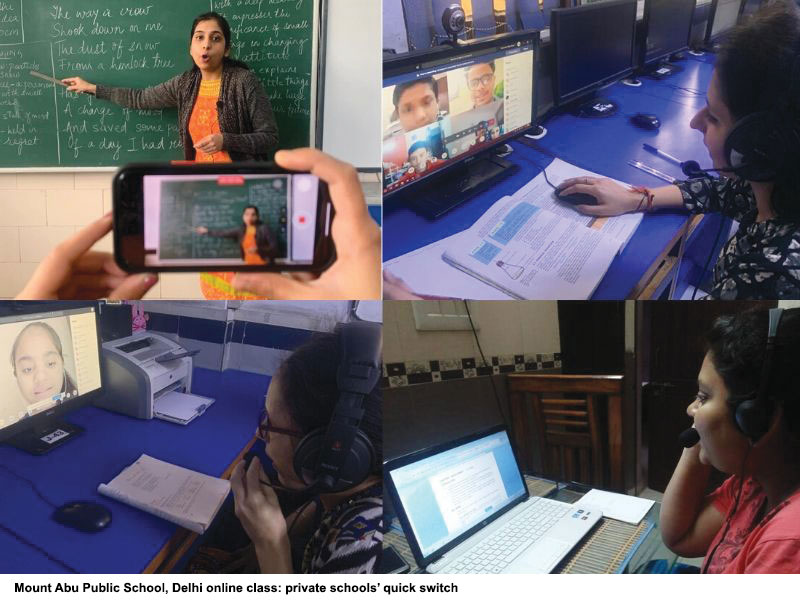
The breakout of the global Coronavirus, aka COVID-19, pandemic has brought education systems around the world to a grinding halt with lockdowns and stay-at-home orders prompting mass closure of education institutions. In India, since the March 25 mandatory nationwide lockdown, all teaching, assessment and evaluation work in education institutions has been adversely impacted and in most cases deferred. All major examinations, including public entrance exams such as JEE and NEET have been postponed and several schoolleaving board exams in the states of the Indian Union abandoned midway. On March 18, the schoolleaving class X and XII exams of the Delhi-based pan-India CBSE and CISCE school boards were postponed until further notice. This story was repeated in higher and professional education institutions, which also had to close down campuses and discontinue classes and project work mid-semester.
Meanwhile on April 1, the CBSE board, which has 22,145 affiliated schools, issued a statement directing them to award mass promotions to all students in classes I-VIII as mandated by s.16 of the Right of Children to Free & Compulsory Education (RTE) Act, 2009. For students in classes IX and XI, whose examinations are pending, the board has directed schools to use term results to promote or detain students.
Class X exams have been completed (except for the riot-hit area of Delhi’s northeast district) but evaluation work is on hold with evaluators asked to assess papers at home and submit marks online. For class XII, the board has decided to reschedule exams for 11 main subjects when external conditions permit. The CISCE board has not officially cancelled its exams but is to take a decision on rescheduling them.
The silver lining of this depressing scenario is acceleration of the switch to online education platforms and options countrywide. The national digital education platform SWAYAM, a massive open online courses (Moocs) initiative of the Union HRD ministry, offers a wide array of school to university study programmes including 61 undergrad
and 43 postgraduate courses. It is seeing a spike in users after UGC and AICTE advisories. SWAYAM courses
— managed and conducted by IIT professors — offer class IX to university-level lectures on Prabha DTH TV
channels, and are being promoted as a useful interim arrangement to cope with current classroom transaction
disruptions.
Meanwhile — and perhaps inevitably — top-ranked private schools, colleges and universities have quickly switched to online platforms to deliver lectures, lessons, assignments and even project assignments to athome students using Zoom, WebEx, Loom, Google classroom, Skype, among others. “We were among the first schools in the country to move to online classes in the first week of March itself. Currently we conduct daily online classes from 8 a.m-1 p.m using Zoom and Google Classroom. I am confident that all glitches will be removed as teachers and students become familiar with the technologies involved, which is a bonus in itself,” says Arunabh Singh, director of the CBSE-affiliated Nehru World School, Ghaziabad.
Indeed some educationists paradoxically appreciate that the Covid-19 crisis has accelerated the leisurely pace at which Indian educators were introducing game-changing ICT (information communication technologies) in education. “Never before in history have India’s higher education institutions adopted new technologies and pedagogies with such zeal. Some institutions which were proactive in utilising technology have the advantage over status quoists, who preferred continuity over modernisation. But now everybody is realising there is no escape from online learning and have started getting their acts together. This will do a lot of good to the education system,” says Asheesh Gupta, pro vice chancellor of Lakshmipat University, Jaipur.
Experts say training teachers to use virtual platforms is an objective that needs priority attention as there
is no dearth of online content. AICTE has taken the lead in developing programmes to speed up a mindshift change within the K-12 teachers community, especially of government schools, in the days ahead. But the general uncertainty and disruption has added to the anxiety of students, teachers and parents and other stakeholders and it may take at least a full year of realignment for students, teachers and administrators.
Monitors of the education scene, and especially your editors, have become more hopeful that the budgetary outlays of the Central and state governments for education — which add up to a mere 3 percent of GDP currently — will increase substantially. The positive fallout of the Covid-19 pandemic sweeping the country is that it has dragged the education sector kicking and screaming into the digital era.
Autar Nehru (Delhi)





















